Room & Playspace Setup: Difference between revisions
ArchantosVR (talk | contribs) No edit summary |
ArchantosVR (talk | contribs) No edit summary |
||
| Line 1: | Line 1: | ||
== Dimensions == | == Dimensions == | ||
[[File:Playspace Setup.png|border|left|frameless| | [[File:Playspace Setup.png|border|left|frameless|322x322px]] | ||
A good area for pole dance in virtual reality should have enough room for a full 360 degree freedom of motion around the fitness pole. Ideally, the radius should be equal to your whole body length, but given the possibility of smaller rooms, the recommended minimum for your playspace would be '''6ft width x 6ft length x 7.3ft height (1.8m width x 1.8m length x 2.22m height).'''<blockquote>''Pole dancing in small playspaces might restrict you from performing certain moves, have increased risk of injury, and might cause software/hardware malfunctioning.''</blockquote> | A good area for pole dance in virtual reality should have enough room for a full 360 degree freedom of motion around the fitness pole. Ideally, the radius should be equal to your whole body length, but given the possibility of smaller rooms, the recommended minimum for your playspace would be '''6ft width x 6ft length x 7.3ft height (1.8m width x 1.8m length x 2.22m height).'''<blockquote>''Pole dancing in small playspaces might restrict you from performing certain moves, have increased risk of injury, and might cause software/hardware malfunctioning.''</blockquote> | ||
Revision as of 02:55, 26 July 2023
Dimensions

A good area for pole dance in virtual reality should have enough room for a full 360 degree freedom of motion around the fitness pole. Ideally, the radius should be equal to your whole body length, but given the possibility of smaller rooms, the recommended minimum for your playspace would be 6ft width x 6ft length x 7.3ft height (1.8m width x 1.8m length x 2.22m height).
Pole dancing in small playspaces might restrict you from performing certain moves, have increased risk of injury, and might cause software/hardware malfunctioning.
Specs
The most common poles get held in place by the own pressure which gets generated through the expansion of the pole itself. This means that there would be certain limitations or considerations when it comes to the composition of your ceiling and flooring.
Flooring:
- Any material, except ceramic tiles, will work with the stability of your pole;
- Carpets, linoleum, epoxy, rubber, and PVC types of flooring might get damaged from the pressure of the pole;
- Avoid placing the pole
Ceiling:
- Hard continuous, concrete, hardwood, metallic types of ceiling are hard and stable enough to sustain the stability of pressurized hold of the pole;
- Drywall and studded types of ceiling demand additional hardware (such as wide and robust sheet of plywood) to distribute the pressure over larger area and avoid cracks or damages to the ceiling itself;
- Angled ceilings should be avoided. Yet, you can still engineer flat and leveled platforms to make that pole fit;
- Drop ceiling usually isn't compatible for the most common poles;
Safety
- Do not install the pole over or under loosened pieces, such as rags, towels, unscrewed sheets of plywood etc;
- If you have additional padding to be placed over the floor, consider trimming/modifying it to be placed around already installed pole;
- Avoid placing the pole unevenly close to corners or objects.